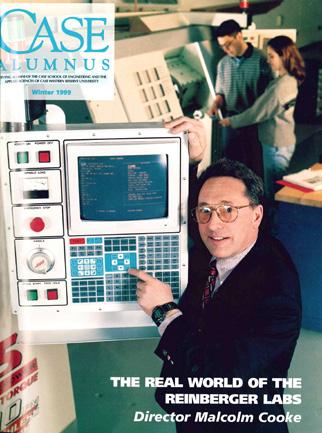
3 minute read
Make-a-thon marvel
aLuMni aDventures
Make-a-thon marvel
Advertisement
”I was constantly looking for different opportunities, more than just donating money or talking to someone on the phone. I was really looking for that personal connection. Alumna finds that make-a-thons allow her to apply her engineering skills while pursuing a passion
By John Canale
There are many ways to show your support for the troops, from bumper stickers to front porch flags to social media posts. Emily Szabo ’19, MS ’20, takes her patriotic support a step further by putting her engineering skills to work.
In the last year and a half, the recent graduate has participated in five make-athons sponsored by Challenge America Makers for Veterans, a non-profit organization that partners with local VA hospitals. At the challenges, engineers and makers come together to form teams, brainstorm ideas and design medical devices that could help veterans overcome injuries and live fuller lives.
Szabo, who earned her bachelor’s degree in biomedical engineering and her master’s in mechanical engineering, relishes the experiences.
“The make-a-thons are not only a great opportunity to get hands-on design experience, they’re a great opportunity to learn about entrepreneurship and what it takes to get a product to the market,” she said. “You also learn things like, ‘How do we make this affordable for hospitals, for your average person to purchase and use in their homes?’”
Szabo, who lives in the Cleveland suburb of Strongsville, is a manufacturing engineer for Neuronoff, a Cleveland medical device developer. She’s also working toward her doctorate in mechanical engineering at Case. She’s found that make-a-thons allow her to polish her skills while fulfilling a mission.
“I had a passion from when I was young to work with veterans in some capacity,” she said. “I thought I might go into the military after high school. I just felt some kind of connection. I was constantly looking for different opportunities, more than just donating money or talking to someone on the phone. I was really looking for that personal connection.”
She was a student at Case when she learned of Challenge America and signed up for her first make-a-thon in 2019. It turned out to be what she calls one of the best experiences of her life.
Six weeks before the make-a-thon, she and the five other engineers on her team were introduced to Chris, a U.S. Army veteran who had suffered nerve damage overseas.
“When we met Chris, his wife was pregnant with their first child,” Szabo said. “Because of his injury, he couldn’t get up and down from the ground very well. He wanted to be able to get down on the floor and play with his kid. He said, ‘I don’t want my child to have to adjust to me. I want to adjust to them.’”
With that as inspiration, Team Chris came up with a cane-like device that Chris could use to walk comfortably. When he wanted to lower himself to the ground, it would deploy legs similar to a tripod. That innovation allowed him to get down on the ground and get back up again.
Since that project, Szabo has volunteered for four more make-a-thons. Most recently, she collaborated remotely with a Challenge America team trying to help first responders adjust to the pandemic.
“We call ourselves ‘Team Foggy Goggle’ and we worked on a way to keep eyewear from fogging, which has been a real problem for medical staff and caregivers,” she said.
From clearing foggy goggles to helping a new dad play with his child, Szabo uses make-a-thons to share her skills. She also found that connection to veterans that she always sought.
John Canale is a freelance writer in Greater Cleveland. To comment on this story, email casealum@casealum.org.










